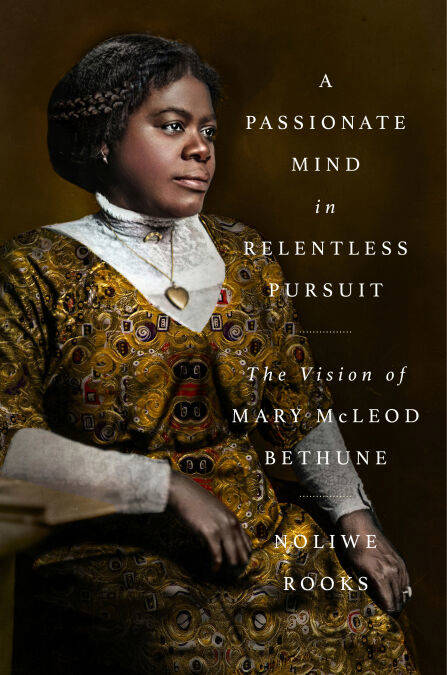
- Retrait gratuit dans votre magasin Club
- 7.000.000 titres dans notre catalogue
- Payer en toute sécurité
- Toujours un magasin près de chez vous
- Retrait gratuit dans votre magasin Club
- 7.000.0000 titres dans notre catalogue
- Payer en toute sécurité
- Toujours un magasin près de chez vous
19,15 €
+ 19 points
Format
Description
An intimate and searching account of the life and legacy of one of America’s towering educators, a woman who dared to center the progress of Black women and girls in the larger struggle for political and social liberation
When Mary McLeod Bethune died, tributes in newspapers around the country said the same thing: she should be on the Mount Rushmore of Black American achievement. Indeed, Bethune is the only Black American whose statue stands in Statuary Hall in the US Capitol, and yet for most, she remains a marble figure from the dim past. Now, seventy years later, Noliwe Rooks turns Bethune from stone to flesh, showing her to have been a visionary leader with lessons to still teach us as we continue on our journey toward a freer and more just nation.
Any serious effort to understand how the Black civil rights generation found role models, vision, and inspiration during their midcentury struggle for political power must place Bethune at its heart. Her success was unlikely: the fifteenth of seventeen children and the first born into freedom, Bethune survived brutal poverty and caste subordination to become the first in her family to learn how to read and to attend college. She gave that same gift to others when in 1904, at age twenty-nine, Bethune welcomed her first class of five girls to the Daytona, Florida, school she had founded and which would become the university that bears her name to this day. Bethune saw education as an essential dimension of the larger struggle for freedom, vitally connected to the vote and to economic self-sufficiency, and she enlisted Eleanor Roosevelt, Harry Truman, Franklin D. Roosevelt, and many other powerful leaders in her cause.
Rooks grew up in Florida, in Bethune’s shadow: her grandmother trained to be a teacher at Bethune-Cookman University, and her family vacationed at the all-Black beach that Bethune helped found in one of her many community empowerment projects. The story of how Bethune succeeded in a state with some of the highest lynching rates in the country is, in Rooks’s hands, a moving and astonishing example of the power of a mind and a vision that had few equals. Now, when the stakes of the long struggle for full Black equality in this country are particularly evident—and centered on the state of Florida—it is a gift to have this brilliant and lyrical reckoning with Bethune’s journey from one of our own great educators and scholars of that same struggle.
When Mary McLeod Bethune died, tributes in newspapers around the country said the same thing: she should be on the Mount Rushmore of Black American achievement. Indeed, Bethune is the only Black American whose statue stands in Statuary Hall in the US Capitol, and yet for most, she remains a marble figure from the dim past. Now, seventy years later, Noliwe Rooks turns Bethune from stone to flesh, showing her to have been a visionary leader with lessons to still teach us as we continue on our journey toward a freer and more just nation.
Any serious effort to understand how the Black civil rights generation found role models, vision, and inspiration during their midcentury struggle for political power must place Bethune at its heart. Her success was unlikely: the fifteenth of seventeen children and the first born into freedom, Bethune survived brutal poverty and caste subordination to become the first in her family to learn how to read and to attend college. She gave that same gift to others when in 1904, at age twenty-nine, Bethune welcomed her first class of five girls to the Daytona, Florida, school she had founded and which would become the university that bears her name to this day. Bethune saw education as an essential dimension of the larger struggle for freedom, vitally connected to the vote and to economic self-sufficiency, and she enlisted Eleanor Roosevelt, Harry Truman, Franklin D. Roosevelt, and many other powerful leaders in her cause.
Rooks grew up in Florida, in Bethune’s shadow: her grandmother trained to be a teacher at Bethune-Cookman University, and her family vacationed at the all-Black beach that Bethune helped found in one of her many community empowerment projects. The story of how Bethune succeeded in a state with some of the highest lynching rates in the country is, in Rooks’s hands, a moving and astonishing example of the power of a mind and a vision that had few equals. Now, when the stakes of the long struggle for full Black equality in this country are particularly evident—and centered on the state of Florida—it is a gift to have this brilliant and lyrical reckoning with Bethune’s journey from one of our own great educators and scholars of that same struggle.
Spécifications
Parties prenantes
- Auteur(s) :
- Editeur:
Contenu
- Nombre de pages :
- 208
- Langue:
- Anglais
- Collection :
Caractéristiques
- EAN:
- 9780593492437
- Date de parution :
- 22-07-24
- Format:
- Ebook
- Protection digitale:
- Adobe DRM
- Format numérique:
- ePub

Les avis
Nous publions uniquement les avis qui respectent les conditions requises. Consultez nos conditions pour les avis.






